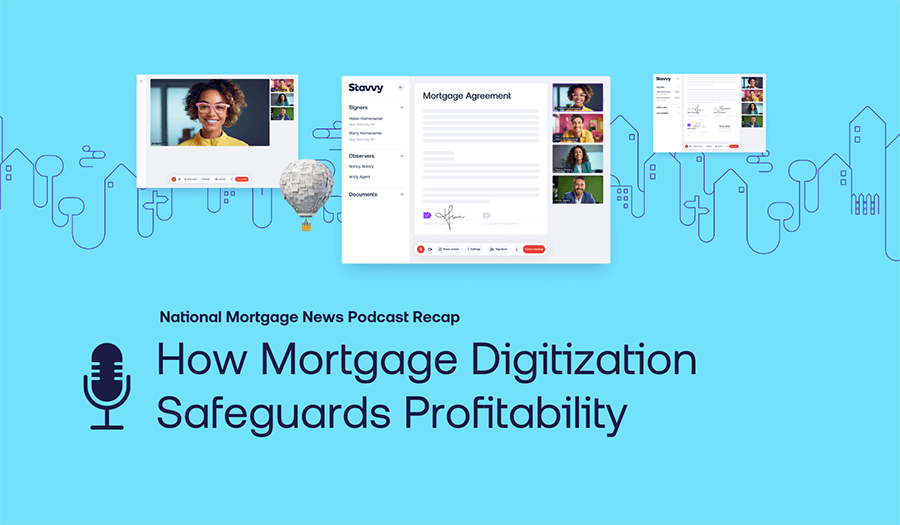Digital transformation is inevitable in the banking and financial services sectors, including residential mortgage lending, but it’s a lengthy, ongoing process.
While the pandemic helped accelerate the use of technology in paper-based manual processes, like electronic signatures and notarization, bringing benefits to homeowners and businesses alike, government regulations and fear of the unknown still pose significant roadblocks to widespread adoption.
Here’s what three guests of our Finside Chats podcast had to say about the benefits of digital transformation and the obstacles the residential lending industry still needs to overcome.
Benefits of digital transformation in residential lending
Touchstone Closing and Escrow is based in Andover, MA but does a good percentage of its business in New Hampshire, where remote online notarization (RON) is authorized. RON, which enables essential documents to be signed and notarized without the signer and notary being in the same location, is an example of digital transformation that’s saving customers hundreds of dollars per closing—plus other benefits, said Jack O’Donohue, Touchstone’s co-founder.
“We're saving people drive time,” he said. “We're saving the [quality control] part of it. We're really solving all the chain of custody issues with the documents and signatures. So it's just providing that better experience for the customer.”
Part of providing that better experience is meeting customers’ evolving expectations about technology, said Jim Milinkovich, Operations Director at The Title Team, a title provider based in Eden Prairie, MN.
“I have kids in their early 20s. I don't know that they buy or do anything without their mobile device as part of the process,” he said. “And that's kind of what we had to do with title services. How do we take title from its traditional, ‘Here, sit at the table and sign’ and bring it to the digital world?”
The Title Team opted to include RON as a closing option to grow their business and become a title and settlement service leader in the Midwest.
“The signing process is done in about 15 minutes. The whole infrastructure makes it very simple for us and is a cost-saving model. In the long term, we’ll save more time, we can do more closings, and we don't have the mileage expense of sending our staff out to remote locations. Plus, homeowners love it.”
Jeremy Potter, Stavvy’s Chief Evangelist, who joined the podcast guest line-up, agrees but cautions organizations that aren’t ready to evolve. The demands of increasingly tech-savvy customers can create tension with their banking and financial services companies, particularly businesses that are unprepared or reluctant to adopt new technology and digital processes.
Obstacles to digital transformation in residential lending
Digital transformation efforts often have to deal with a fear of the unknown. It’s not that banking and financial service companies are necessarily resistant to change, but stakeholders feel a responsibility to protect their organization and customers from the unintended consequences of change; Potter said:
“In the direct-to-consumer or B2C world, where you’re talking about things that are held dear by consumers—something sentimental or meaningful and something that’s really important to their livelihood, like their financial accounts—anything in that space, there’s going to be a responsible piece of this that says, ‘I need to actually know what some of these consequences are going to be or what risks I’m taking. And not knowing risks is riskier to me than trying.’ And so I think that causes a lot of organizations, especially large organizations, to take a lot of time on the decision.”
Even though digital transformation is not a new term or trend—it’s something that lenders and title and settlement agencies, for example, have been dealing with for decades—there are always new obstacles to overcome.
“eSignature has been a solution since 2000,” O’Donohue said. “And we've been fielding the question for my entire career: ‘Why can’t we do this electronically?’ And I just can't wait until we can finally say that we can offer [your closing] fully electronic. But to that effect, it's an incredibly complicated situation.”
In the mortgage industry, digital transformation relies heavily on government regulations, and these changes are mostly happening at the state level, with varying degrees of progress being made nationwide. More than half of the United States has enacted RON legislation, which is exciting to see but leaves non-RON states, like Massachusetts, in the gray.
“Particularly in states like Massachusetts, where we've got the convergence of legal, we've got the convergence of the finance industry, municipalities, title, insurance, finance, it's a mess,” O’Donohue said.
Digital transformation in residential mortgage lending doesn’t have to be scary. And although government regulations can limit your options, it doesn’t have to stop you in your tracks. Staying up to date on mortgage technology trends and products and passing legislation can help you modernize your processes and prepare your organization for the digital future.
Learn more about how the  is taking real estate beyond documents.
is taking real estate beyond documents.



![[Webinar Recap] Advancing Your Digital Default Servicing Strategy](https://blog.stavvy.com/hubfs/advancing-your-digital-default-servicing-strategy-blog-recap.png)